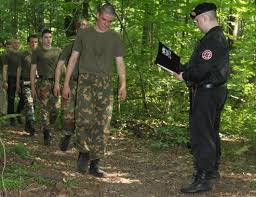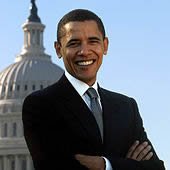As discussions swirl about the effectiveness of the current cease fire in Ukraine, it is becoming increasingly clear that the separatists fighting there have become important actors in their own right, much as Kimberly Marten predicted in the Monkey Cage blog. Moreover, in addition to homegrown Ukrainian separatists, we also now have to consider the motivation and capabilities of Russian nationalists who have come to Ukraine ostensibly to aid the separatists in their fight. [See this post on the Monkey Cage blog]
In interviews conducted last week in Moscow with several major figures from Russian nationalist movements and Russian experts studying them (no names will be given in order to preserve their anonymity and security), the picture that emerges above all is one of anarchy. Obviously these narratives must be taken with caution, and reflect only the partial reality of some actors, but it struck me how they themselves are surprised by the overall opaqueness in which they are operating.
According to estimates from those I interviewed, between 100 and 200 Russian volunteers have left for Donbass. It is important to distinguish volunteers from mercenaries. Volunteers are usually young men, without families, with limited or no military training, hoping for a romantic ‘rite of passage’ on a battlefield, a la Byron. Mercenaries, on the other hand, are often former security services officers or army contractors who fought in Afghanistan, Chechnya, or Yugoslavia, who are well trained, unable to return to civil life, and follow a field commander in whom they believe. Many mercenaries are related, directly or indirectly, to the Russian National Unity (RNU) movement of Alexander Barkashov, traditionally very active in the regions close to the borders of Ukraine and North Caucasus, and which offers serious paramilitary training (see one of their propaganda videoclips). The RNU is supposedly closely associated to members of the self-proclaimed government of Donetsk and in particular of Dmitri Boitsov, leader of the Orthodox Donbass organization, who is said to have been taken orders directly from Barkashov.
The volunteers come from several other Russian nationalist groups: the Eurasianist Youth inspired by the Fascist and neo-Eurasianist geopolitician Alexander Dugin; the now-banned Movement Against Illegal Immigration led by Alexander Belov; the group ‘Sputnik and Pogrom’; the national-socialist Slavic Union of Dmitri Demushkin; several small groups inspired by monarchism such as the Russian Imperial Movement; and some from the more Western-oriented groups such as the Russian Social Movement of Konstantin Krylov, often defined as a ‘national-democrat’. However, with the exception of the RNU, heavily involved in Donetsk, these groups do necessarily cover all volunteers, as the majority of them left of their own initiative and using their own funds. Some groups such as the Russian Social Movement do not organize the departure of their young volunteers, others like the Eurasianists seem more disposed to build networks that facilitate these trips.
Nonetheless, several of the groups do provide humanitarian aid (mostly medicine) and send light weapons and ammunition (although it should be noted that this is done individually by the different groups and not in a coordinated manner). Their ability to deliver weapons and ammunition remains modest and should not be exaggerated. That they can do this at all is thanks to their links to some paramilitary groups and to officers retired from active service who know how to obtain decommissioned Soviet-era weapons stockpiles. According to my interviews, Russian border guards and Cossack troops that patrol the Russian side do not welcome these volunteers, who either pass through outside check points or bribe border guards. Once in the Lugansk and Donetsk regions, utter anarchy reigns; each group exacts significant bribes, even from those who come to help them. Those caught at the border by Russian border guards are repatriated back to Moscow or St Petersburg, and some seem to have been jailed.
What conclusions can be drawn from these narratives? First of all these few volunteers, both in their unpreparedness and their lack of integration into a chain of command, put in peril not only their own lives, but those of civilians in Donetsk and Lugansk. In addition, these missions may be of concern to the Kremlin as well, which sees them as rogue elements who are likely to one day return to Russia and will bring back with them their experiences of urban warfare.
More fundamentally, these narratives shed light on the operation of the Russian state. When Vladimir Putin personally makes a decision, as was the case for the annexation of Crimea, the Russian state is highly functional: the chain of command is fully, flawlessly operational, and both the administrative and public affairs apparatuses operate in a clearly defined and controlled manner. When the Kremlin decided to exit the situation in order to create a lawless zone in which it is impossible to determine responsibilities, the Russian state became highly chaotic. Russian nationalist movements are a part of this anarchy, alongside experimental field commanders like Igor Strelkov, militia mercenaries, and corrupt former officers who participate in it for both ideological and financial reasons.
Of course this ‘laissez-faire’ attitude is in the Kremlin’s interests. It allows for the futures of Ukraine and the Kyiv government to be permanently weakened, and avoids the necessity of assuming international responsibilities. Some figures close to the Russian authorities add to the complexity of the pictures, such as Orthodox oligarch Konstantin Malofeev, who many suspect of funding the self-proclaimed government of Donetsk. However, it seems also accurate to see the situation as a Pandora’s box that the Kremlin is now struggling to close, seriously concerned about the long term impact of this Russian nationalist junta that could potentially turn against Moscow. Donbass is a mess not only for Kyiv, which is unable to manage a flawless military operation, but also for Moscow. It remains to be seen whether order can be restored on the Russian insurgent side in coming weeks. In any case the irony of the history is that a man so risk averse and wedded to the status quo as Vladimir Putin, whether consciously or not, himself may have initiated dynamics that are no longer under his control.
See this post on the Monkey Cage blog | Marlene Laruelle











